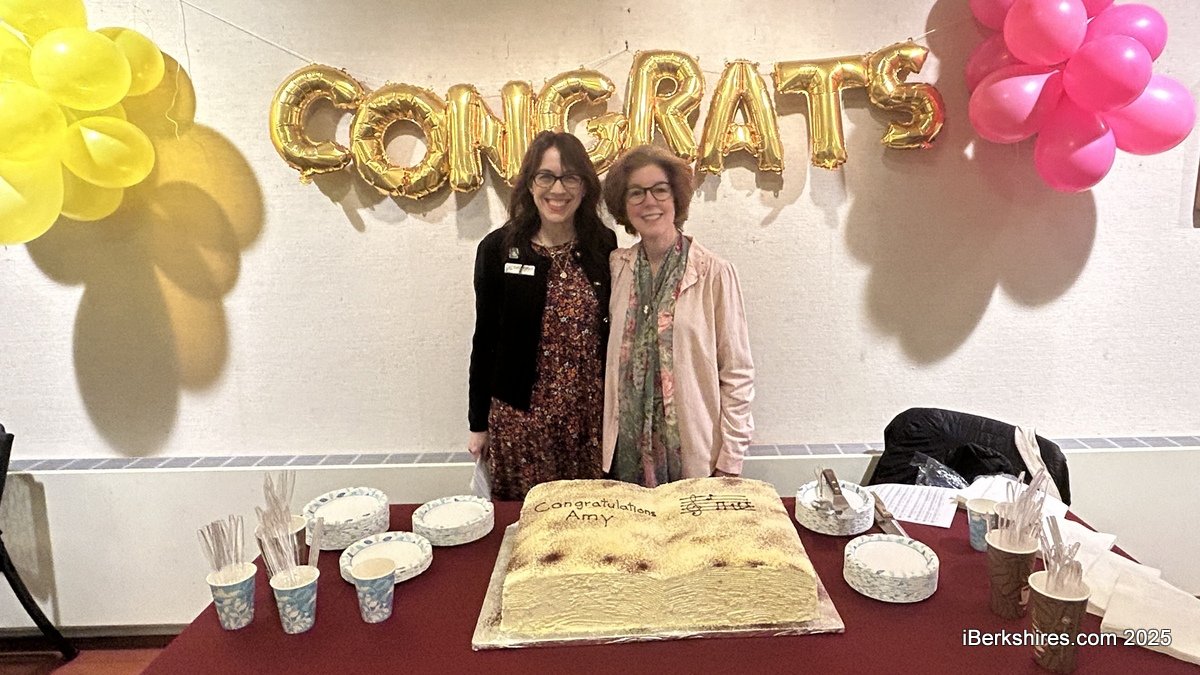
Project Native Film Festival Celebrates 10 Years
GREAT BARRINGTON, Mass. — Despite the windy chill, people came out by the hundreds Sunday to show their support for the area's only native plant nursery and seed bank, which is celebrating its 10th anniversary this year.Project Native held its first all-day film festival at the Triplex Cinema and the Mixed Company Stage, with environmentalists, residents, local farmers and restaurateurs, visitors and supporters ready to watch, listen and learn about the future of our water, land and food.
 Emcee Taylor Mali introduces farmer and film director Severine van Tscharner Fleming at Project Native's first film festival. |
"This place has been mobbed all day," she said. "Every single show has been sold out, every movie has filled up. We've had people waiting in line for 'rush' seats to see if they can get in. I don't think anyone was expecting this. It's great."
Although admittance to the films was free (thanks to local sponsors and generous support from the Dr. Robert C. and Tina Sohn Foundation), it took a gutsy, determined audience to make it through many the films, all of which were documentaries, and many of which dealt with the harsh realities of the state of the world's water supply, the degradation of the Earth's soil as well as the effects of carcinogens, known and unknown, in our everyday lives. Films such as "Dirt!" directed and produced by Bill Benenson and Gene Rosow, outline the rapid degradation of soil (i.e. the "Earth's ecstatic skin.") This degradation is mostly because of global climate change and man's desire to mine land for natural resources, as well the surge of mono-crop farming (soy and corn), the practice of which strips the soil of nutrients and contaminates it with pesticides and nitrogen fertilizer.
Fortunately, the news wasn't all bad. Poet and festival emcee Taylor Mali said the films are meant to "educate, inspire, engage, enrage or all of the above." And the festival did end on a hopeful note, with director-farmer-activist Severine van Tscharner Fleming's film "The Greenhorns."
Fleming traveled across the United State for nearly two years filming and documenting the young farmers' movement. Her film glimpsed the struggles and victories of "greenhorns" in rural Georgia as well as urban San Francisco, as they endeavored to make the land viable for organic food production as well as make a living for themselves and their families. After the screening of "The Greenhorns," Fleming herself was on hand to talk about her journey and the future of young American farmers.
"A lot of people my age are interested in living the change," said the 29-year-old. "There's not a lot of pop cultural space for farmers these days. We need to understand that there's a lot of us and knowing our collective momentum is a big part of having that confidence."
 'The Greenhorns' filmmaker Fleming talks about young farmers in America. |
"We are now acting like grown-ups," she said. "We are taking advantage of the digital literacy of our generation to band together. We have the movie project, more than 50 podcasts, a Wiki that then turned into a 'zine. We get a least a thousand hits a day on our blog. These are resources for young farmers who may be geographically marginalized but we are all digitally harmonized."
Fleming said that while the social media component of the young farmers' movement is helpful, more needs to be done in terms of providing farmers with land grants and startup incentives.
"Every day we lose 2,000 acres of land to sprawl, prisons and fracking," she said. "It's not difficult to see that when you drive across this country and for seven hours there's just corn, or for two days, just corn. These are no longer farmers, they are managers of some kind. We need more allies to make this happen. Quality food is worth working for."
Project Native will continue to celebrate its 10-year anniversary with workshops throughout the summer as well as a fall birthday bash. For more information, go to www.projectnative.org.
















